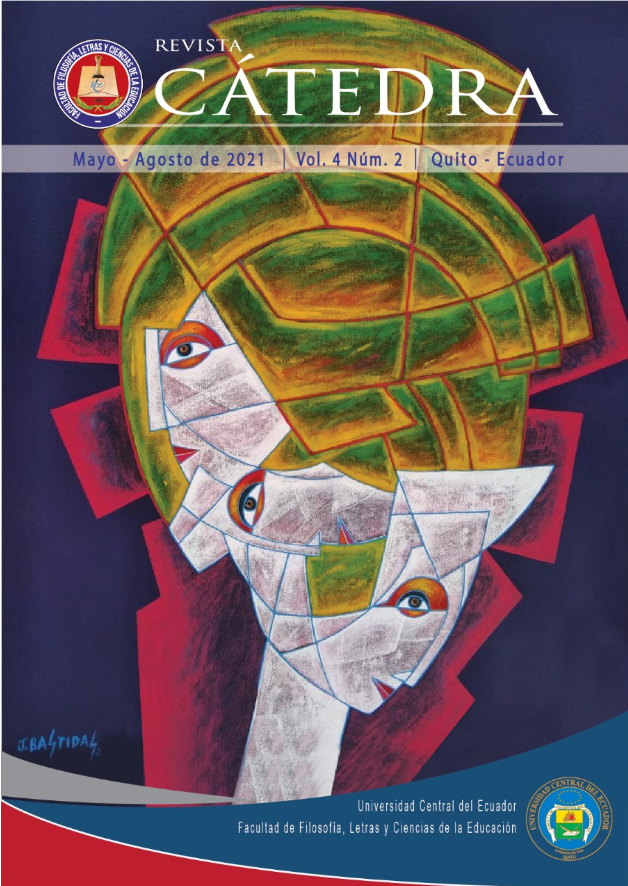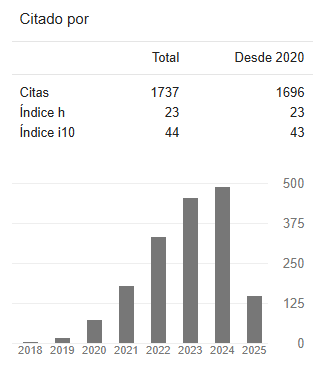The concept of guilt from the main references of contemporary philosophy
DOI:
https://doi.org/10.29166/catedra.v4i2.2982Keywords:
guilt, contemporary philosophy, existentialism, transcendence, responsibility, authenticityAbstract
The manuscript discusses the concept of guilt from Nietzsche, Heidegger, Jaspers and Ricouer as the main referents of contemporary philosophy that have addressed this issue. The article reflects on the different conceptions of guilt and its relation to the modern subject, its existence, transcendence and responsibility. In a technified era, dominated by the utilitarian and consumerist tendency, mass production and the alienation that the human being lives with respect to himself, it becomes indispensable to rethink about authenticity, individuality and subjectivity in singular contexts such as ours. The methodology used for the structuring of this document is based on the main guidelines of qualitative research, it is supported by the bibliographic review, the analysis of texts, and consequently, the hermeneutic method for the interpretation of theories, categories, principles, doctrines and conceptions. The article is structured in four sections: The first section presents a discussion on the concept of guilt and the birth of conscience from the Nietzschean perspective. The second section refers to the concept of guilt in Martin Heidegger's philosophy, explaining the function of guilt in the clarification of the meaning of being. The third section makes an exposition on the relationship between the concept of guilt and transcendence according to Karl Jaspers. Finally, the fourth section explores the relationship raised by Ricouer on the concept of guilt and responsibility.
Downloads
References
Acevedo, J. (2013). El sentido heidegggeriano de la culpa y la melancolía. Revista de filosofía, 55-66.
Ballbé, R. (1964). Reflexiones sobre el sentido de la culpa. Revista de Psicología, 13-26.
Elders, L. (1983). El sentimiento de culpabilidad según la psicología, la literatura y la filosofía modernas.
Gabriel , M. (1964). La dignidad humana. Barcelona: Atalaya.
Heidegger, M. (2003). El ser y el tiempo. México: Fondo de cultura económica.
Jaspers, K. (1967). Psicología de las concepciones del mundo. Madrid: Gredos.
Jaspers, K. (1989). Filosofía de la existencia. México: Fondo de cultura económica.
Jaspers, K. (1992). Filosofía. Tomo II. México: Fondo de cultura económico.
Lenis, J. (2015). Avatares de la conciencia moral. Imputación, culpa y responsabilidad. Discusiones filosóficas, 69-85.
Mejía, M. (2002). Culpa y Deuda. Affectio Societatis, 1-7.
Mounier, E. (2000). El personalismo. Madrid: Taurus.
Nietzsche , F. (2011). Genealogía de la moral. EDIMAT: Madrid.
Nietzsche, F. (1951). Obras completas. México: Aguilar.
Nietzsche, F. (2012). Así hablaba Zaratustra. Barcelona : Plutón.
Prini, P. (1957). Las tres edades del existencialismo. Monteagudo.
Redondo , M. (2001). Cuidado y culpa en ser y tiempo de M.Heidegger. Lapsus, 21-32.
Ricouer, P. (2002). Del texto a la acción. Ensayos de hermenéutica II. México: Fondo de cultura económica.
Ricouer, P. (2004). Finitud y culpabilidad. Madrid: Trotta.
Rojo, F. (2017). Tratado del bien y del mal. La ética como filosofía primera. Universidad Pontificia Comillas, Madrid: Facultad de Ciencias Humanas y Sociales.
Sartre, J. (1992). El humanismo es un existencialismo. Barcelona: Edhasa.
Segovia, N. (2015). Finitud y culpabilidad de Paul Ricoeur. Puebla: Univversidad Iberoamericana Puebla.
Unamuno, M. (1983). Del sentimiento trágico de la vida. Madrid: Bruguera.









